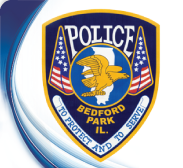Bullying Warning Signs
The following may be signs that your child is being bullied:
• Avoiding certain situations, people, or places, such as pretending to be sick so that he or she does not have to go to school
• Changes in behavior, such as being withdrawn and passive, being overly active and aggressive, or being self-destructive
• Frequent crying or feeling sad
• Signs of low self-esteem
• Being unwilling to speak or showing signs of fear when asked about certain situations, people, or places
• Signs of injuries
• Suddenly receiving lower grades or showing signs of learning problems
• Recurrent unexplained physical symptoms such as stomach pains and fatigue
www.stopbullying.gov
Curfew Questions
What is curfew in Bedford Park?
The current curfew ordinance states: Any person between the ages of 12 and 17 shall not be present upon any public way in the Village:
Between the hours of 11:00 p.m. Friday and 6:00 a.m. Saturday
Between the hours of 11:30 p.m. Saturday and 6:00 a.m. Sunday
Between the hours of 11:30 a.m. Sunday and 6:00 a.m. Monday
Between the hours of 10:30 p.m. and 6:00 a.m. on any other day of the week…unless accompanied by parent, guardian or other responsible party of at least 21 years of age.
Any person under the age of 12 shall not be present upon any public way in the Village:
Between the hours of 9:30 p.m. and 6:00 a.m. on any day of the week… unless accompanied by parent, guardian or other responsible party of at least 21 years of age.
What if my child is out after curfew?
Any officer who finds a child in violation of this ordinance shall warn the child and report the incident to the shift commander. A written notice of violation of village ordinance will then be served upon the parent, legal guardian or person in charge of the child.
Youth Violence Information/Resources
The National Youth Violence Prevention Resource Center Hotline offers information on youth violence and referrals to organizations providing youth violence prevention and intervention services.
The National Youth Violence Prevention Resource Center is a “one-stop shop” for information on youth violence prevention, sponsored by the Centers for Disease Control and Prevention and other Federal agencies.
Where do you go if you're wondering how to help a friend who is depressed, what to do if someone you know is planning to commit a violent act, or how to start a nonviolence program in your school? What can you do to make a positive difference?
We’ll help you find out what you need to know about violence – how to prevent it, and how it influences the decisions that you and other teens make.
NYVPRC Toll Free Hotline:
1-866-SAFEYOUTH (1-866-723-3968)
1-888-503-3952 (TTY)
Hours: Monday-Friday 8 a.m. to 6 p.m. (Eastern Time)
Parental Resources
U.S. Consumer Product Safety Commission
Help keep your family safe by checking product recalls and safety news from CPSC. The website features recalls and product information, as well as an interactive kid friendly section.
www.cpsc.gov
Crisis Hotlines
Toll-Free 24-Hour Crisis Intervention Hotlines
+National Hopeline Network: This national crisis hotline network connects people who are depressed or suicidal, or those who are concerned about someone they love, automatically to a CONTACT USA or AAS certified crisis center
1-800-SUICIDE (784-2433)
+National Runaway Switchboard: For runaway youth, teens in crisis, and concerned friends and family members
1-800-621-4000
www.1800runaway.org
+National Domestic Violence Hotline: A hotline for victims of domestic and family violence at home, and concerned family and friends.
1-800-799-SAFE (7233)
1-800-787-3224 (TTY)
www.ndvh.org
+National Child Abuse Hotline: A hotline for parents, children, professionals, and anyone concerned that child abuse is occurring.
1-800-4-A-CHILD (1-800-422-4453)
www.childhelp.org
National Sexual Assault Hotline: This hotline connects sexual assault victims to local rape crisis centers
1-800-656-HOPE (1-800-656-4673)
www.rainn.org
|
